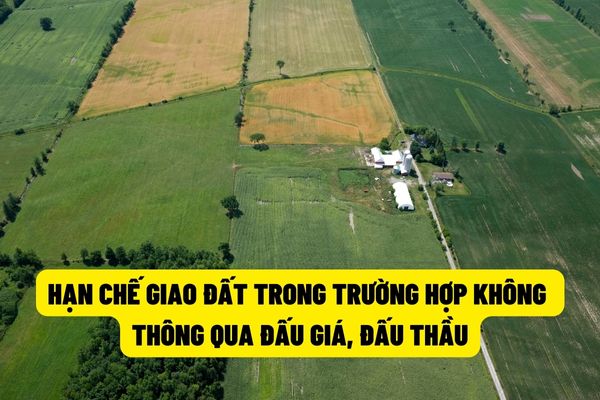Restricting land allocation cases without auctioning land use rights and soliciting bids for implementation of projects using land in Vietnam in the near future?
Shall land mainly allocated and leased by auctioning land use rights and soliciting bids for implementation of projects using land in Vietnam?
Based on Sub-section 2, Section IV of Resolution 18-NQ/TW in 2022, the regulations for the implementation of land allocation and land lease in the near future are as follows:
- Land allocation and land lease will primarily be conducted through land use rights auctions and project bidding using land. Specific regulations on land use rights auctions and project bidding using land; restricting and strictly regulating cases of land allocation and land lease not through land use rights auctions or project bidding using land; ensuring transparency and publicity, having synchronized and specific mechanisms to handle violations of regulations on land allocation and land lease, especially related to land use rights auctions and project bidding using land.
- Primarily implementing the form of land lease with annual land rent payment, with specific provisions for cases of one-time land rent payment, suitable to the nature and purpose of land use, ensuring stable revenue, and preventing loss to the state budget. The state will allocate land with non-payment of land levy for land used for religious establishments and offices of religious organizations. Religious organizations using land for other purposes must pay land rent to the state as per legal provisions. Provisions on conditions of land allocation, land lease, and usage limits for religious organizations should be suitable to the existing land fund of the locality.
In the near future, land allocation and land lease will primarily be conducted through the implementation of land use rights auctions and project bidding using land.

Restricting land allocation cases without auctioning land use rights and soliciting bids for implementation of projects using land in Vietnam in the near future? (Image from the internet)
Shall the management and strict control of repurposing of land in Vietnam, especially paddy farming land and protection forest land, be strengthened?
Based on Sub-section 2, Section IV of Resolution 18-NQ/TW in 2022, the requirements for strengthening management and control of land repurposing are as follows:
Strengthening management and strictly controlling land repurposing, especially paddy farming land, protective forest land, special-use forest land, production forest land (natural forest), land of state enterprises undergoing divestment or equitization, and multi-purpose land; enhancing decentralization and authority along with inspection and supervision, promoting administrative reform in land repurposing.
Hence, enhancing management and control of land repurposing, particularly for paddy farming land, protective forest land, and special-use forest land, is required.
Which cases will be subject to land lease with land rent in Vietnam according to current regulations?
Based on Article 56 of the Land Law 2013, the regulations are as follows:
“Article 56. Land Lease
1. The state leases land with annual land rent payment or one-time land rent payment for the entire lease period in the following cases:
a) Households and individuals using land for agricultural, forestry production, aquaculture, salt making;
b) Households and individuals wishing to continue using agricultural land exceeding the quota stipulated in Article 129 of this Law;
c) Households and individuals using commercial land; land for mineral activities; land for production of building materials, ceramics; non-agricultural production establishment land;
d) Households and individuals using land for building public works with business purposes;
đ) Economic organizations, overseas Vietnamese, and foreign-invested enterprises using land for agricultural, forestry production, aquaculture, salt making investment projects; non-agricultural production land; land for building public works with business purposes; land for housing investment projects for lease;
e) Economic organizations, self-financed public service units, overseas Vietnamese, and foreign-invested enterprises using land for constructing public works;
g) Foreign organizations with diplomatic functions using land for building headquarters.
2. The state leases land with annual land rent payment to people's armed forces units using land for agricultural, forestry production, aquaculture, salt making or combined with defense and security tasks.”
Land lease with annual land rent payment or one-time land rent payment for the entire lease period shall be executed as stipulated above.
Which cases are subject to land repurposing in Vietnam according to current regulations?
Based on Article 57 of the Land Law 2013, the regulations are as follows:
“Article 57. land repurposing
1. Cases of land repurposing requiring permission from competent state agencies include:
a) Conversion from paddy farming land to perennial crop land, forest land, aquaculture land, salt production land;
b) Conversion from other annual crop land to brackish water aquaculture land, salt production land, aquaculture land in the form of ponds, lakes, and lagoons;
c) Conversion from special-use forest land, protective forest land, forest production land to other uses within the agricultural land group;
d) Conversion from agricultural land to non-agricultural land;
đ) Conversion from non-agricultural land allocated by the state without land levy to non-agricultural land allocated by the state with land levy or leased land;
e) Conversion from non-agricultural land not being homestead land to homestead land;
g) Conversion from land for building public works, land used for public purposes with business purposes, non-agricultural production land not being commercial land to commercial land; conversion from commercial land, land for building public works to non-agricultural production establishment land.
2. When converting the land use purpose as specified in Clause 1 of this Article, the land user must fulfill financial obligations as prescribed by law; the land use policies, rights, and obligations of the land user shall be applied in accordance with the land type after the conversion.”
Thus, the land repurposing shall be carried out as stipulated above.
LawNet
